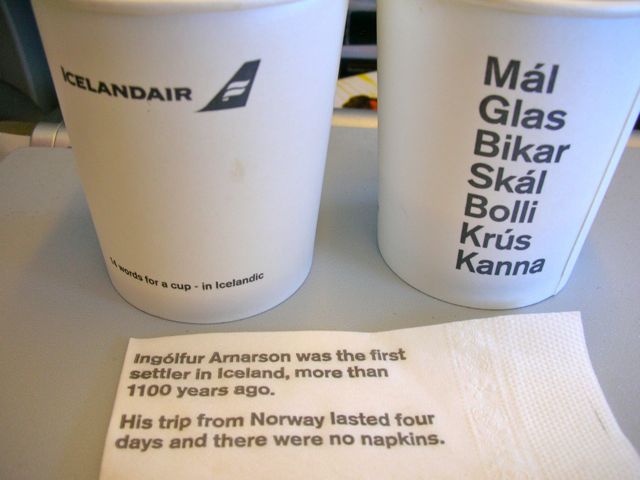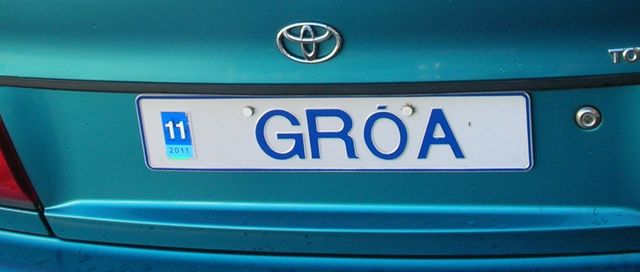Ísland: Iceland
Population: around 313,000
For the traveller to Iceland, the first sign of clever marketing of Íslenska (we speak English but think about what else we speak!) is in the Icelandair aeroplane, in which Icelandic is used for
- announcements
- briefing cards
- on the seat antimacassars, Icelandic phrases and commentary e.g. on the ‘soft and cuddly sound’ of Góða nótt ‘good night’ [check the cuddly claim here].
- and on the paper cups, 14 words for drinking vessels

[ Photo courtesy of David Nash]
Surely the smallest language group to have its own airline.
In Reykjavík, there are plenty of signs of belief in the power of writing. Despite its location on the route between several big English-speaking countries, it has managed to resist much of the pressure to advertise in English and have signs in English. For print-addicts, the city language-scape is a treasure-house – vocabulary is reinforced by seeing words in other languages in signs and notices both public (roads, schools, monuments) and private (shop and business names and windows, advertisements, churches, graveyards). And hey! vanity plates using Icelandic diacritics [Gróa was a witch healer in Norse mythology].

[ Photo courtesy of David Nash]
Cyber-space is also sparkling with .is pages in Icelandic for enterprises, commerical, public and sociable – even the knit cafes get mentioned.. (see Handprjónasamband Íslands (the Hand-knitting association of Iceland). BUT the website for the parent airline group appears in English and doesn’t advertise an Icelandic alternative. Uhuh. Commercial decisions are probably the coal-mine canaries for language health.
We went into several bookshops (Eymundsson and Mál og Menning) with cafés. It is impressive how much is written in Icelandic, and how much is translated (check out Forlagið). It’s wide-ranging – from Richard Dawkins on God (a big display) to translations of Finn Family Moomintroll, Astrid Lindgren and Harry Potter, to Bill Bryson, to a whole heap of airport reads (John Grisham, Jodie Picoult, Charlaine Harris). All this with a small population, and having to import paper.
All of this must be helping standardise ways of talking about new ideas, so expanding the domains in which it is easy to talk Icelandic. The Berlitz guidebook to Reykjavík shamed its parent company by sniffily commenting on the Icelanders’ ‘pedantic’ habit of compounding Icelandic roots to form words for new concepts. But does that reflect the views of outsiders complaining about Icelanders not using loanwords, or the frustration of some at the language purism of others? Anyway I am sorry now that I didn’t check how ‘vampire’ was translated, let alone ‘true blood’.
The emphasis on literacy goes way back – we saw a good exhibition at Þjóðmenningarhúsið (‘The Culture House’) of early writing (the catalogue is good). Nice maps of places referred to in the sagas. What I found touching was everyday use: on a spindle whorl (disk with whole in centre) runes saying Þóra á mig [translated as ‘I belong to Thora], and on a wooden spade Páll lét mik [gera] Ingjaldr gerði [mig] P had me [made], I made [me]’. Mitts off, this is mine.
And the Icelanders are investing in studying the Icelandic language – an astonishing number of people work on it (cf this list). Eirikur Rögnavaldsson and other people at Háskoli Íslands are compiling a 25 million word corpus of Icelandic [.pdf], open source tools for analysing Icelandic, and also a diachronic corpus (which they have the means to do, since, through civil war, annexation by Norway/Denmark, the Black Death, volcanic eruptions, smallpox and famine, Icelanders managed to keep on writing and reading. Recently, a project headed by Höskuldur Þráinsson sent out a syntactic questionnaire on structures of interest across Iceland and the Faroes, and got a high response rate. The data should allow a much better understanding of syntactic variation across dialects.
And there’s a lot of available stuff for teaching outsiders Icelandic (courses at Múlti Kúlti [cute clippie name] and also a free online course run by Háskoli Íslands). I was tempted by some good-looking dictionaries but considerations of weight mastered what was really just greed.
Oh, what happens when a people have their own country… Let’s hope this investment in language can survive their enormous debt – as Peter Austin mentioned, they’ve already had to cut back.
 Follow
Follow
Air Nauru (now called Our Airline) has one plane and I think beats your claim for “Surely the smallest language group to have its own airline” — there is also Air Kiribati with 3 planes. I’ve never flown with them but I would imagine there is no evidence of Nauruan or Gilbertese on their planes.
Yeah for “Finn Family Moonintroll”, it should be translated into as many languages as possible.
Great article! I’ve included it on this week’s edition of Four Stone Hearth. Check out the post here: http://theprancingpapio.blogspot.com/2010/10/four-stone-hearth-103.html
Interesting read. FYI, vampire in Icelandic is Blóðsuga, literally “blood sucker”